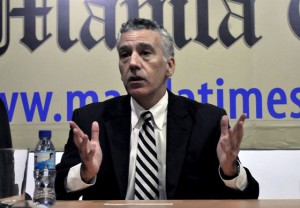United States Ambassador Philip Goldberg said improved governance and the rule of law are among the most important reforms that should be in place to attract more American investors into the Philippines.
In an exclusive roundtable interview with The Manila Times journalists on Friday, Goldberg stressed the need to improve the country’s governance, rule of law, infrastructure, and investment policies and programs.
“If you are a foreign investor . . . you have to have a good reason to come here and think this is a better place to invest in than Singapore or Malaysia or any other country in the region,” he said.
While the Philippines is trying hard to attract foreign investors, problems in infrastructure, good governance, and the rule of law are “not necessarily created out of thin air,” he said.
Goldberg said infrastructure issues such as the poor state of airports, port terminals and containers, roads, and electricity need to be addressed.
He raised the need to amend the provisions of the Constitution on foreign ownership and equity ownership.
“What are we doing? How are we trying to help in this situation? What we are doing is helping government through our systems programs, through our trade and investment assistance or program,” he told The Times.
The ambassador said the US government was keenly watching the Philippines’ economic growth in the past year, with high-ranking officials such as the defense and commerce secretaries and no less than US President Barack Obama visiting the country.
During her visit to Manila, US Secretary of Commerce Penny Pritzker had promised to come back and bring another trade delegation.
Pritzker was checking out the economic situation “because of economic growth and dynamism here and the interest on the part of American businesses.”
Goldberg said that one of the projects in the $434-million Millennium Challenge Corporation (MCC) grant to the Philippines is a 250-kilometer road in Samar, one of the poorest provinces in the country.
The construction of road and infrastructure could boost Samar’s development, he said.
Goldberg said the Bureau of Internal Revenue (BIR) must “modernize and improve its collection techniques and to try to prevent corruption.”
“These are the kinds of things we are working on with the Philippines. We have very strong support from most of the departments and agencies of the government,” the ambassador said, noting other “structural issues” affecting interaction between government agencies and private corporations.
The US is also trying to help the Philippines get involved in the second round of negotiations of the Trans-Pacific Partnership (TPP), a US-led initiative which intends to enhance trade and investment among partner countries, promote innovation, economic growth and development, and support the creation and retention of jobs.
The first round of negotiations for TPP involves Australia, Brunei Darussalam, Canada, Chile, Japan, Malaysia, Mexico, New Zealand, Peru, Singapore, the United States and Vietnam.
The agreement began in 2005 and negotiations were supposed to end in 2012, but contentious issues on agriculture, intellectual property and services and investments delayed the program.
Goldberg said a second round of talks cannot start until the first one produces positive results.
“In the policy level, these are the things we are trying to put out there to be discussed,” he added.
The US, Goldberg said, was second last year in the list of countries with a high trade volume with the Philippines.
He acknowledged that China, a growing economic, political and military power in the region, is moving up in terms of trade and investment relations with the Philippines.
Washington’s rebalance to Asia has always been viewed as the US’ way to contain a rising China, but Goldberg said their foreign policy in Southeast Asia has nothing to do with confronting China.
“What’s important to keep in mind is we all want good relations with China. We all have important stakes in China and the rise of China.
We also want that rise to be in a way that protects all of our interest [and] that is able to be done peacefully and without all kinds of upset in the region,” the envoy stressed.
The Philippines and China are in the middle of a territorial row that has seen Manila file an arbitration case before a United Nations-backed court.
The US supported the Philippines’ move, as well as its various proposals, including the Triple Action Plan (TAP), to manage the territorial disputes in the region.
China, however, warned Washington against intervening in regional affairs.


